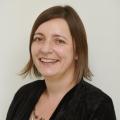Three brightly-coloured furry characters, dreamed up in Norwich and playing in a vibrant valley based on Great Yarmouth, are winning lots of love.
They are the Mixmups, created by Norwich woman Rebecca Atkinson and now enchanting families on national television and making life brighter for disabled children.
Pockets the bear, Giggle the cat and Spin the rabbit live in a helter-skelter house and play on a roundabout based on the Tyrolean Tubtwist ride at Yarmouth’s Joyland.
Mixmups, on Channel 5 every weekend, has already been called ‘magical,’ ‘vibrant and ‘glorious’ in the national press and named among the best British programmes on television by the British Film Institute.
Aimed at three-to-five year olds, each charming 10-minute story involves the three Mixmups friends mixing themselves an adventure with a magical box and spoon and a sprinkling of sparkles.

Giggle, an orange cat with curvature of the spine, uses a wheelchair (and has a pet guinea-pig on rollerskates, as dreamed up by Rebecca’s daughter several years ago); Pockets is a blue bear with a sight impairment and a guide dog; Spin is a boisterous red rabbit.
Mixmups is not a series about disability; it is a series in which some of the characters are disabled.
Each time the Mixmups mix a new adventure, their magical mixing box unfolds into the setting of the story and they leave their wheelchair accessible helter skelter house to explore the moon, or grow a fruit salad tree or find a library where all the books can talk.
Rebecca has written every one of the 52 stories, as well as designing the Mixmups and their world, and executive producing each episode.
It all began nine years ago as mother-of-two Rebecca tidied her children’s toys (they are now teenagers) and realised there were no representations of disability. She is partially deaf, wore hearing aids from the age of three, and became progressively partially-sighted as an adult.

Unable to find toys with disabilities she began creating tiny hearing aids for dolls and posting photographs online. A picture of a doll with a hot pink cochlear implant garnered so much attention that she was invited to become a consultant for a major toy company. Calling her campaign Toy Like Me she inspired mainstream manufacturers to introduce toys with disabilities.
But, feeling change was not coming quickly enough and fearing manufacturers would not move away from cliched images of disability, Rebecca decided to create her own television animation.
When each Mixmups adventure goes awry the wise Lucky Loover Bird repeats the Mixmup motto ‘There's always another way,’ in her Norfolk accent.
It is Rebecca’s motto too.
Born and brought up in Norwich, she adored television as a child and went on to study audio-visual design at art school before landing a job with the BBC, working in children’s television, entertainment and documentaries, and later becoming a freelance journalist.
‘The whole time I was quite interested in how disabled people were represented,’ said Rebecca, who has finally created the disabled characters she yearned to see.
She wanted her television show for pre-schoolers to be fun and funny and reflect the way young children play.

It is instantly captivating. The children I watched it with decided which character they would be for each episode, sang along with the music, and debated plot points as the stories took them from races in the park (where the fastest runner does not always win) to an Easter Egg hunt with all three Mixmups searching for noisy eggs.
Before beginning writing, mentored by Norwich children’s author Joyce Dunbar, who is also deaf, Rebecca studied play theory, learning how and why children play. Keen to get every detail of her creation correct she sought advice from Norfolk children who use wheelchairs.
And it is not just the characters who are disabled. The Mixmups are voiced by children with disabilities and are watched over by a magical bird played, with a Norfolk accent, by Norwich actor Gillian Dean, who is visually impaired.
The design of the show is deliberately uncluttered and uses bright, high-contrast colours to make it easier to see. The fur of each puppet feels different too – so that they will be easy to distinguish by touch if they get turned into toys.
‘I would love for there to be Mixmups toys because that was the beginning of this journey, me wanting toys that disabled children could recognise themselves in,’ said Rebecca from her studio in Norwich city centre, surrounded by pictures and models of Mixmups from first concept to television stars.
‘It’s too early to say whether there will be toys yet but I’m hopeful there might be some books.’

Her Toy Like Me campaign has morphed into an arts and play organisation for disabled children, including the teddy bear hearing clinics Rebecca runs as part of Norwich Deaf Festival every year, with children enjoying stories about a deaf bear and getting hearing aids for their toys.
The Mixmups puppets are made by the internationally renowned British company which worked on films and television series including Pingu, Bob the Builder and Tim Burton’s Corpse Bride .
When Rebecca visited the workshop she said it felt like peering into her own brain.
She is thrilled by the colourful, and international, splash Mixmups is making. They are already due to be shown in Australia, Canada and Ireland as well as the UK.
‘It feels quite surreal, a dream come true.’ she said. ‘I feel incredibly privileged to be able to make Mixmups and put disabled children on screen and create disabled-led television.’
Catch Mixmups every Saturday and Sunday morning on Channel 5 and streaming on My5.



























